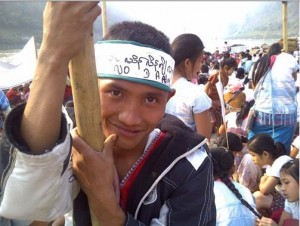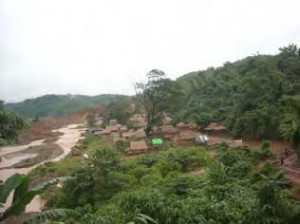Business and Human Rights (138 found)
European Union Should Not Lift Sanctions On Burma
The European Union is currently reviewing its policy on sanctions on Burma. On 22nd April the EU Foreign Affairs Council will decide whether to continue the suspension of EU sanctions, or to lift sanctions. We are concerned that the premature lifting of European Union sanctions […]
• • •Love Salween Group Condemns Blocking of Free Expression in Karenni State
We, the Love Salween Group, condemn government authorities for denying local villagers their democratic rights by blocking them from organizing a prayer ceremony to mark the Global Day of Action for Rivers on March 14, 2013 at Wan Awn village, Pasaung township of Karenni state […]
• • •Fate of Salween Dams Remains Unclear
 Some 2,000 internally displaced people and villagers from the Wei Gyi area gathered on March 14 by the Salween riverbank to protest continued plans to construct six hydroelectric dams on the river.
Some 2,000 internally displaced people and villagers from the Wei Gyi area gathered on March 14 by the Salween riverbank to protest continued plans to construct six hydroelectric dams on the river.
The ceremony, which included prayer services by a Buddhist monk and a Christian pastor, was also attended by community leaders from Dawei, who themselves are resisting massive development projects in their area […]
2,000 Karens Gather on the Salween to Call for a Halt to Dam Plans
About 2,000 internally displaced people and villagers from the Wei Gyi area gathered yesterday at Ei Htu Hta Internally Displaced Persons (IDP) camp on the Salween riverbank to mark the International Day of Action for Rivers and Against Dams in an event organized by Karen Rivers Watch […]
• • •Rampant Land Confiscation Requires Further Attention and Action from Parliamentary Committee
 This past week the parliamentary Farmland Investigation Commission submitted its report on land confiscation to the parliament. The report finds that the military have taken almost 250,000 acres of land from villagers. The commission stated that they had spoken to military leaders about the confiscation, “Vice Senior-General Min Aung Hlaing […] confirmed to me that the army will return seized farmlands that are away from its bases, and they are also thinking about providing farmers with compensation.”
This past week the parliamentary Farmland Investigation Commission submitted its report on land confiscation to the parliament. The report finds that the military have taken almost 250,000 acres of land from villagers. The commission stated that they had spoken to military leaders about the confiscation, “Vice Senior-General Min Aung Hlaing […] confirmed to me that the army will return seized farmlands that are away from its bases, and they are also thinking about providing farmers with compensation.”
The investigation is a step in the right direction but there still exist very large problems the commission has not addressed, the first being that the commission only addressed land confiscated by the military. Although the military has been involved in land confiscations they are not the only perpetrators.
An example of the shortcomings of the commission’s report is the fact that the Letpadaung copper mine is not mentioned by the commission because the land was not confiscated outright by the military, although it is a joint venture with the military owned Union of Myanmar Economic Holdings Ltd (UMEH). Additionally the Letpadaung Inquiry Commission headed by Aung San Suu Kyi charged with investigating the abuses that took place has delayed releasing its findings for a third straight time […]
Burma/Myanmar Not Ready for Rights-Compliant Investment
The current legal, political, and economic context in Burma/Myanmar does not enable foreign investment that complies with key international norms and standards. This is the finding of an informal visit to Burma/Myanmar carried out by the International Federation for Human Rights (FIDH) along with […]
• • •Harvard Plan to Restart Irrawaddy Dams Will not Buy Peace
A recent proposal by a Harvard University think-tank to restart the Irrawaddy-Myitsone dam project in order to “power the peace process” in Kachin state fails to address the political root causes of the conflict […]
• • •EU Should Re-Introduce Visa Ban on Military
We, the undersigned members and observers of the European Burma Network, condemn the ongoing attacks on the Kachin people and call on the international community to put pressure on President Thein Sein and the Burmese Army to immediately end the military offensive in Northern Burma and allow access to humanitarian aid for internally displaced persons […]
• • •Giant Chinese Industrial Zone Threatens Burma’s Arakan Coast
A new report by Arakan Oil Watch called “Danger Zone” exposes how a planned Chinese industrial zone is threatening the livelihoods of tens of thousands of people in Arakan State as well as Burma’s second largest mangrove forest.
The 120 sq km Kyauk Phyu Special Economic Zone, planned around the terminals of the trans-Burma natural gas and oil pipelines, will evict up to 40 villages, while many fear the impacts of toxic waste and pollution from petrochemical and metal industries […]
• • •New Report: Women Urge Halt to Expansion of Damaging Karenni Tin Mines
The Mawchi tin mines have inflicted decades of environmental and social damage in southern Karenni State and new expansion plans should be halted, according to a new report by a network of local women.
Lost paradise, by the Molo Women Mining Watch Network, details how hundreds of mine tunnels spanning about 3,000 acres have caused lethal landslides, water pollution and deforestation, impacting about 4,500 indigenous villagers […]
• • •








 All posts
All posts